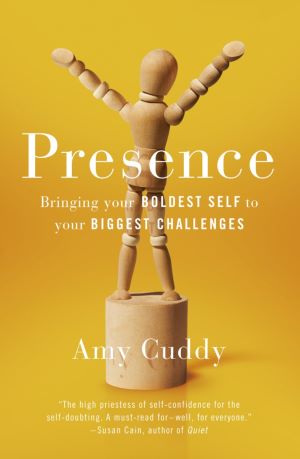Presence

The book Presence by Amy Cuddy is an enjoyable book. It is about facing challenging situations, such as a job interview, meeting, presentation, public speaking, entrepreneur pitches, or any such occasion. Basically, “bringing your boldest self to your biggest challenges”. Although the book touches on psychology and biology, it does not demand to be enthusiastic in those areas. It remains helpful, informative and entertaining for any average person. The author also decorates the book’s main line with stories, many of which are from her life that I appreciated.
It was enlightening to learn about the connection between body poses and hormones and how they affect our behaviour and performance. One of the main conclusions of the book is related to this point. While our body poses reflect our current mental states, such as confidence, enthusiasm, and feeling comfortable versus fear and anxiety, we can even boost our cognitive capabilities by taking concise so-called power poses. It’s like a two-way road. It can work in the opposite direction too.
This idea sounds unnatural in the beginning. Imagine that you are sitting in a meeting and minding your body posture instead of concentrating on the discussion, but the book suggests to “fake it till you become it”. This idea is quite controversial and may be accepted differently by individuals. While I believe there is some truth to it, I leave it to you to judge it for yourself.
Sometimes we also tend to undervalue ourselves, especially when more senior or experienced professionals surround us. It can easily cause us to remain silent, not speak up when we have something to say, lose confidence and have fears such as “I don’t deserve to be here”. The book does a decent job of helping us overcome our fears and suggests various techniques to really “bringing your boldest self to your biggest challenges”. Overall the book is a comprehensive, well-written one on its subject.
The author also uses stories from her life, making the book very authentic. It is also true for her TED talk, where she also talks about her car accident and how her head injury impacted her life.
Finally, I came across a quote from the author that I found pretty nice. “Our nonverbals govern how other people think and feel about us.”
What I liked the most:
- Nice and comprehensive on its subject
- Authentic, the author uses a lot of her own stories
- It was easy to follow
What I didn’t like much:
- The idea of forcing specific power poses and “fake it till you become it” might be too much of a request for many.

Comments